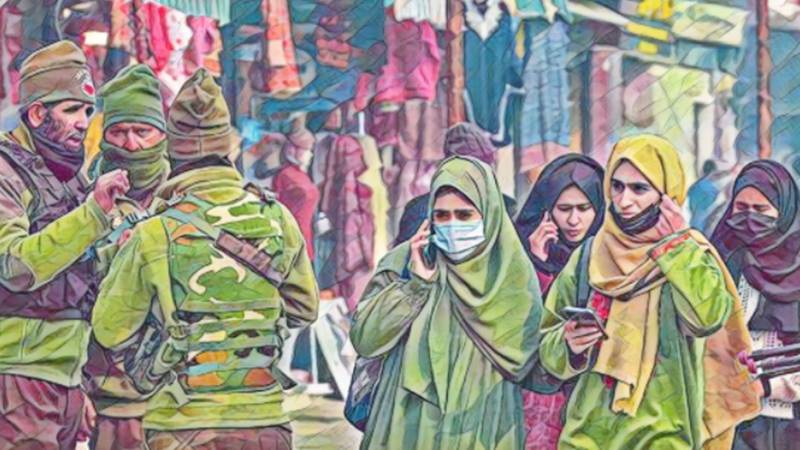
The Supreme Court of India delivered a landmark and much awaited judgment on 11 December 2024. The apex court upheld that the abrogation of Article 370 in Jammu and Kashmir, and the carving out of Ladakh, as constitutionally valid. The court also directed the Election Commission of India to ensure elections are held to the J&K assembly by 30 September 2024. The Court has also recommended that the Government form a truth and reconciliation commission to record human rights abuses in Jammu and Kashmir by both sides and non-state actors.
This judgment by the top court of India is nothing but a validation of the great injustice committed by the government of Prime Minister Narendra Modi against the oppressed people of Indian Kashmir in August 2019. The judgment came in response to many petitions challenging the abrogation of article 370 of the Indian Constitution in 2019. The court further ruled that article 370 was an interim arrangement and the BJP government’s controversial decision to scrap the disputed territory’s limited autonomy was the “culmination of the process of integration.”
The Indian judges ought to have also known that all Indian Governments in the past have denied the Kashmiri people their fundamental human and civil rights and have treated Kashmir as a conquered territory by refusing to investigate any abuses by their own troops in the region. Many parties loyal to New Delhi were included by the petitioners in the appeal to the Supreme Court and some petitioners were rewarded for their loyalty by putting Mehbuba Mufti and Omar Abdullah under house arrest before announcing the verdict in this case.
By the abrogation of Article 370 and the validation from the Supreme Court, India will now be able to turn Kashmiris into a minority in their own lands where they have lived since generations. The region of Jammu and Kashmir has been recognised by the world community as disputed territory since 1947, but now India is trying to create new facts on the ground. The Indian Home Minister Amit Shah said in the Lok Sabha that “Nehruvian blunders” had hurt New Delhi’s case regarding Kashmir. He was referring to PM Nehru’s acceptance of ceasefire in the 1947-48 war in Kashmir and taking the Kashmir Case to the Security Council of the UN.
This decision by the Supreme Court will strengthen the vicious Indian grip over Kashmir but it will not be able to extinguish the fighting spirit or the desire of the Kashmiris for freedom and dignity.
Kashmir has been the festering wound and the unfinished agenda of the partition of India. It has been the bone of contention between India and Pakistan since the very dawn of independence. Pakistan has always extended diplomatic and political support for the rights of the people of Kashmir and supported them in their struggle for freedom. The country has gone to war with India in 1965 and struggled at all diplomatic forums, but the Kashmir issue remains unsolved to this day. The skirmish in 1948 and the Kargil incursions brought both countries to the brink of war and resulted in countless deaths and injuries. "International law doesn't recognise India's unilateral and illegal actions of 5 August 2019. The judicial endorsement by the Indian Supreme Court has no legal value. Kashmiris have an inalienable right to self-determination in accordance with the relevant UN SC resolutions," caretaker Foreign Minister Jalil Abbas Jilani said.
Addressing a press conference in Islamabad, Jilani said India has "no right to make unilateral decisions on the status of this disputed territory against the will of the Kashmiri people.”
"Pakistan categorically rejects the judgment announced by the Supreme Court of India on the status of Jammu and Kashmir,” he said.
After this new development in the Kashmir case, Pakistan as always can only issue its statements of condemnation and express its anger at the latest actions of the Indian government. But there is not much that can be done for Kashmir. Pakistan should continue to extend full political and diplomatic support to the Kashmiri people for their right of self-determination. India has always managed to short circuit all Pakistani attempts by the help of powerful supporters such as the Russians, and all diplomatic initiatives by Pakistan have ended in failure.
The immediate result of this Indian action will be the total collapse of any diplomatic and political interaction between India and Pakistan. The slight hope for a reasonable settlement of the Kashmir dispute is now ended and even the issues of Siachen and Sir Creek appear to be in the doldrums. Future relations between the two nuclear armed nations are fraught with tensions, risks, pitfalls and extreme dangers. While the decision could now be taken up for review by the Supreme Court, the chances of a reversal of the decision are almost nil.
Kashmiri leaders in the Indian-administered parts of Kashmir, including the pro-Indian faction, have unanimously rejected the move and now they will have to convert this unity into a strong wall of resistance and cooperation. The Pakistani government needs to engage the Kashmiri diaspora all over the world, especially in the USA, Canada and the UK to agitate and protest against this latest atrocity of the Modi regime.
War between India and Pakistan could result in a nuclear Armageddon. So, war is not an option. Pakistan should never lose sight of our permanent national interests on the question of the Kashmir dispute, but its options are severely limited. We must continue to agitate about the issue at all international forums including the Security Council, irrespective of the response.

